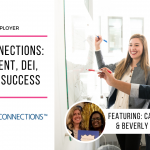In our ever-changing workforce, it’s more important than ever for employers to stay on top of HR trends and what legal implications they may have on their organization, workplace culture and overall brand. We had the chance to speak with Greg McGinnis, Partner at Matthews Dinsdale & Clark LLP, about upcoming trends in employment law. What we discovered was that the trends from the latter half of the last decade are amplifying. Read on to see how.
Although there have been many societal shifts within the last few years, Greg comments that there really aren’t any new or radical changes in employment law, but rather previous trends are continuing. He does mention, however, that there’s a common theme or phenomenon happening as a result of previous trends, like the #MeToo movement, legalization of Cannabis and diversity in the workforce, which is fostering an increased demand for flexibility and zero tolerance for toxic workplaces.
Flexibility and Accommodation
“The main trend, if I can call it that, is that people are looking for flexibility in their work. They’re looking for flexibility in terms of hours of work, days of work, time off when they need it. The big trend is that employees want their work to fit in with their lives, and so employers are increasingly having to accommodate that kind of flexibility. That comes in all kinds of different forms. One form would be people who have young children, who want the time for child care or to attend events in their kids’ lives. Then you also have, especially in Canada, a large population of people who come from other places originally and they travel, so they want to have longer periods of time off to visit family or just travel. There’s an increasing trend towards flexibility at work, where it could be accommodated.”
“The idea that work is Monday to Friday, 9 to 5 and you better just show up – that concept has slowly been eroding for a long time and it’s continuing to erode. There are of course jobs where you need to be [at work] for certain time periods, but even then, people will want extended time off. We see this in every domain, from factory workers to office workers. People are demanding that their personal life and needs are reflected at work.”
Zero Tolerance for Toxic Workplaces
As a result of the same societal factors that gave rise to the #MeToo movement, Greg has found that the number of complaints being made that require the employer to carry out investigations has significantly increased. “I would say the #MeToo movement is a reflection of the same underlying phenomenon that people aren’t prepared to be treated poorly or suffer in silence. There’s next to no tolerance for toxic workplace behaviour. It is increasingly important for employers to ensure their workplace provides a positive, constructive atmosphere for people to work in and if they don’t do it, they will be facing a requirement to invest in workplace investigations…There’s a whole raft of time-consuming expensive consequences that can result from not dealing with these problems.”
Diversity
Diversity is an important value for many organizations. In Greg’s experience, diversity hiring has to be managed effectively by most employers to ensure all job seekers are given an equal opportunity to join a positive workplace, but that’s not always easy to achieve and maintain once your workforce becomes diverse. “Diversity has an impact on workplace culture because when you have new people or experiences, people come to work with different cultural expectations or behaviours that may require an adjustment on the part of the employer.”
Once you recruit a diverse workforce, you need to ensure your policies are, and the workplace is, welcoming, accommodating and, again, flexible. “You have a diverse workforce, you need a diverse workforce, then you need to find ways to reconcile new and different expectations where you need to get the work done. The challenge of diversity is that you don’t really know what’s next, you have to adapt to the people you are employing the best you can, and they need to adapt to you too.”
Cannabis: Biggest Issue That’s a Non-issue
Now that Cannabis has been legal in Canada for over a year, there have been minimal impacts on employment law, according to Greg. “Cannabis is the big nothing. It may have a long term impact, but the short term impact has been next to zero.”
“It’s not that all of a sudden people are bringing their drugs to work or consuming drugs in a different way. Most employers in anticipation of the legalization of cannabis took another look at their fitness for duty policies, and perhaps even their testing policies and gave some thought on how to approach that. Then legalization occurred and people braced themselves for the onslaught of stoners as if all of a sudden we were all going to turn into Cheech and Chong and it just didn’t happen!”
“Outside of safety-sensitive positions where someone could be seriously injured or killed or your actions could result in someone being seriously injured, or death or property damage, the issue of cannabis has not made any difference. And I think the reason for that is – cannabis is just one intoxicant. There’s a wide array of drugs out there, legal and illegal, and the legalization of cannabis has had a marginal impact on the way cannabis impairment, specifically, has been addressed when it’s been detected.”
Gig Economy
There were concerns about the ‘gig’ economy and the impact on the career prospects for millennial and Gen Z workers, but in regards to employment law, it’s really only made employers consider instituting more flexible work environments.
“My perspective on the gig economy is that it’s provided opportunities for people to work in small amounts on their schedule that competes with the regular employment pool. So people who want more flexibility can get it by becoming a gig worker. I think the gig economy has expanded opportunities for people. [Employers] have to recognize that their employees can go and do consulting or gig work as an alternative to regular employment. So it forces more flexibility onto employers as well.”
With the evolution and expansion of trends from the last few years, Greg notes that in the legal sphere, changes in the law are harder to predict. “The world of work is driven more by cultural change than by legal change. We’re not seeing a lot of radical legal changes now or anticipated in the future. The society is changing, so we have to respond to that.” It’s important that employers are staying on the cutting edge of emerging and continuing societal and workplace trends, especially when considering incoming talent will come into the workforce with new and sometimes challenging expectations for employers to meet.
For more TalentEgg Legal Briefs, be sure to subscribe to our monthly employer and career educator newsletter.






Leave a Reply
You must be logged in to post a comment.